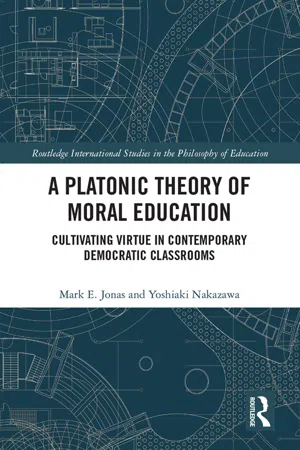
A Platonic Theory of Moral Education
Cultivating Virtue in Contemporary Democratic Classrooms
- 248 pages
- English
- ePUB (mobile friendly)
- Available on iOS & Android
A Platonic Theory of Moral Education
Cultivating Virtue in Contemporary Democratic Classrooms
About this book
Discussing Plato's views on knowledge, recollection, dialogue, and epiphany, this ambitious volume offers a systematic analysis of the ways that Platonic approaches to education can help students navigate today's increasingly complex moral environment.
Though interest in Platonic education may have waned due to a perceived view of Platonic scholarship as wholly impractical, this volume addresses common misunderstandings of Plato's work and highlights the contemporary relevance of Plato's ideas to contemporary moral education. Building on philosophical interpretations, the book argues persuasively that educators might employ Platonic themes and dialogue in the classroom. Split into two parts, the book looks first to contextualise Plato's theory of moral education within political, ethical, and educational frameworks. Equipped with this knowledge, part two then offers contemporary educators the strategies needed for implementing Plato's educational theory within the pluralistic, democratic classroom setting.
A Platonic Theory of Moral Education will be of interest to academics, researchers, and post-graduate students in the fields of: ethics; Plato scholarship; moral psychology; educational foundations; and the philosophy of education. This book would also benefit graduate students and scholars in teacher education.
Mark E. Jonas is Professor of Education and Professor of Philosophy (by courtesy) at Wheaton College, US.
Yoshiaki Nakazawa is Assistant Professor of Education at University of Dallas, US.
Frequently asked questions
- Essential is ideal for learners and professionals who enjoy exploring a wide range of subjects. Access the Essential Library with 800,000+ trusted titles and best-sellers across business, personal growth, and the humanities. Includes unlimited reading time and Standard Read Aloud voice.
- Complete: Perfect for advanced learners and researchers needing full, unrestricted access. Unlock 1.4M+ books across hundreds of subjects, including academic and specialized titles. The Complete Plan also includes advanced features like Premium Read Aloud and Research Assistant.
Please note we cannot support devices running on iOS 13 and Android 7 or earlier. Learn more about using the app.
Information
Table of contents
- Cover
- Half Title
- Series Page
- Title Page
- Copyright Page
- Dedication Page
- Contents
- Acknowledgments
- Introduction
- 1 The Relationship Between Virtue and Knowledge in the Early Dialogues
- 2 Recollection, Wisdom, and the Soul’s “Encrustation”
- 3 Habituation and Kinship With Virtue
- 4 Dialogue as a Method for Cultivating the Virtues
- 5 The Socratic Method of Inducing Epiphanies
- 6 Inducing Epiphanies in Contemporary Classrooms
- 7 Rehabituation in the Contemporary Classroom
- Conclusion
- Appendix: Appetite, Reason, and Education in Socrates’ “City of Pigs”
- References
- Index